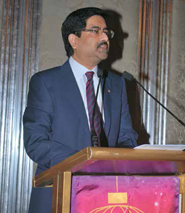
Rotarians captivated by Kumar Mangalam Birla
Kumar Mangalam Birla
Last week’s meeting was a big day for the Rotary Club of Bombay as it welcomed a new member – Kumar Mangalam Birla. He is the Chairman of the multinational Aditya Birla Group. He chairs the boards of major Group companies in India and globally, such as Novelis, Columbian Chemicals, Hindalco, Grasim, UltraTech, Idea, and Aditya Birla Retail. He is the Director on the Central Board of Directors of the Reserve Bank of India; he was also Chairman of the Advisory Committee constituted by the Ministry of Company Affairs and served on The Prime Minister of India’s Advisory Council on Trade and Industry.
Birla took over as Chairman of the Group in 1995, at the age of 28. As Chairman, he has accelerated growth, built a meritocracy and raised the Group’s turnoverfrom $2 billion in 1995, to $40 billion today. Birla has acquired manufacturing plants in Canada, China and Indonesia, plantations in Laos, mines in Australia and set up new plants in Egypt, Thailand and China.The meeting commenced with the induction ceremony where Birla was appointed as an honorary member of the Club. He then took the stage and thanked the Club for inviting him and commended the members for their long-standing work. He also announced that he would be discussing the ‘Make in India’ programme.
He said, “It is only solid foundational values that help corporations survive and prosper over a long period of time. I am an ardent believer in India’s potential and the glorious future than beckons us. What I wish to emphasise today is that the path to a promising future must go through a path of resurgence in manufacturing in India. I believe India has what it takes to be a global manufacturing hub. In fact, an analysis of current trends is a vote of confidence for India as a nucleus for manufacturing activity.”
Birla also shared his thoughts on the potential fallouts of ‘Make in India’ and how the country stands to benefit from it. “India has made great strides in emerging as an IT hub and a global reservoir of intellectual capital.
2014-11-18-The_Gateway_November_18_-_24
 Almost all Fortune 500 companies get their IT services from Indian companies. For example, IBM has a work force of more than a hundred thousand in India. It is high time the manufacturing sector also achieved this kind of progress and recognition. Undoubtedly, we have achieved some strides in our maufacturing capabilities. Today, we are the biggest manufacturers of two wheelers and a major manufacturing hub for small cars. India leads in the pharmaceutical sector, the production of generics and formulations; 90 per cent of the world’s diamonds are polished in India; we have the world’s largest refineries and have become a major exporter of diesel and petrol,” he explained.
Almost all Fortune 500 companies get their IT services from Indian companies. For example, IBM has a work force of more than a hundred thousand in India. It is high time the manufacturing sector also achieved this kind of progress and recognition. Undoubtedly, we have achieved some strides in our maufacturing capabilities. Today, we are the biggest manufacturers of two wheelers and a major manufacturing hub for small cars. India leads in the pharmaceutical sector, the production of generics and formulations; 90 per cent of the world’s diamonds are polished in India; we have the world’s largest refineries and have become a major exporter of diesel and petrol,” he explained.
Indian companies have achieved distinction globally, but despite the progress, the share of manufacturing in GDP in India is only 15 per cent, which compares with 34 per cent for China, 31 for South Korea and 22 per cent for Germany.
Birla explained how this could be bettered. “The importance of the manufacturing sector cannot be over-emphasised. Without a vibrant manufacturing sector, India’s demographic dividend could well become a non-starter. The economy needs to create millions of jobs and only manufacturing activity can deliver job creation on that scale and a sustained basis.
“In the bigger picture, the economic centre of the world, on a geographic level, has been moving consistently from the west to the east. So, making Indian a global manufacturing hub will also capitalise on this shift. This positions us, as a country, on an inflection point. All success stories of economies in the current times have seen them undergo transformations through a manufacturing phase. India cannot be an exception to this phenomenon and cannot leapfrog this phase of change; manufacturing has to become the next big wave for India. The government’s ‘Make in India’ campaign is an affirmation of this.”
Birla discussed how it can be brought to fruition realistically. “The spectacular success of Mangalyaan, the Mars Orbiter mission, illustrated India’s potential for high-class precision engineering, of six sigma quality which is both home-grown and frugal and the manifestation of an audacious global dream. The success of Mangalyaan can be transposed to the development of the economic sector. It represents, in many ways, the success of India’s manufacturing prowess,” he explained.
“There are many compelling examples in India across a number of sectors which have demonstrated global excellence in manufacturing. So, ‘Make in India’ must become a clarion call and doing this calls for a hard look at what stands in the way of India becoming a manufacturing powerhouse. I see three broad areas we need to address with a sense of urgency, if we are to make this happen — regulatory hurdles, infrastructural bottlenecks and developing talent through skills development,” he added.
“I believe that now we are tantalisingly close to seizing the moment and getting it right. All the pieces finally seem to be falling in place. Today, the change is being driven by a sense of conviction and reinforced by a much broader consensus about the direction we are headed in. India is at the cusp of a momentous change of course,” he said, in conclusion.
